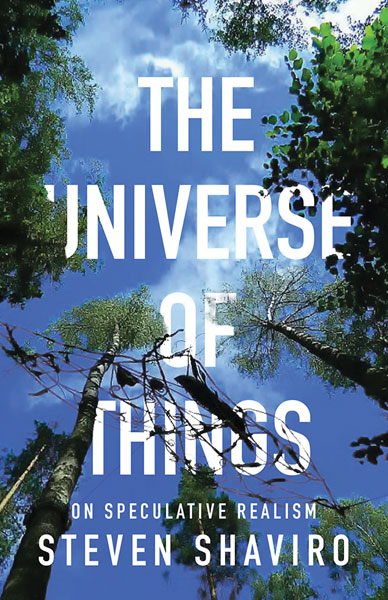
Author and professor Steven Shaviro on “The Universe of Things”
Steven Shaviro is a one-man brain trust, currently holding a position at Wayne State University as he broadens his oeuvre of published work, most recently with The Universe of Things. He graced me with a little Q&A on the areas of his expertise, which I hope you enjoy as much as I did!
Other works by Shaviro include “Doom Patrols,” “The Cinematic Body,” and “Connected, Or, What It Means to Live in the Network Society.”
1. Wow. This books sounds amazing and complex. Can you dumb it down a little for me? What’s this all about?
The book is about a recent trend in philosophy called speculative realism. The aim of this philosophical trend is to get away from human-centered notions, and to find a way to understand and appreciate things in the world as they exist in and for themselves, apart from their relationship to us. This is not an easy thing to do, since by definition we approach the world in terms of our own needs, interests and concerns. It is very hard to detach ourselves from ourselves, so that we can see things from their own points of view instead of from ours. But given the ecological crisis that we face today, this deeper recognition of the rest of the world might well be the most important thing that we could do.
2. What sort of philosophical or literary tradition does this work draw from?
There are many variants of speculative realism, drawing from different philosophical traditions. What unites the speculative realists is their common desire to get away from a human-centered frame of reference. But they do this in all sorts of different ways. My own version of speculative realism, as expressed in my book, is inspired by the philosophy of Alfred North Whitehead (1861-1949), a thinker who was pretty much forgotten for a long time, but who is undergoing a sort of revival today. Whitehead was concerned with what he called “the bifurcation of nature,” the separation between subjective experience and objective scientific analysis. I can talk about my experience of seeing a beautiful sunset, or I can analyze the way the sun produces photons and other energetic particles that stream to the earth and make life possible. Usually people talk about one of these aspects, and dismiss the other as irrelevant; scientists ignore the beauty of the sunset, and poets ignore the nuclear reactions that produce sunlight. Whitehead wanted to find a way that these dimensions could be kept together.
3. Are you suggesting that things have a kind of secret life? What evidence is this based on?
There is good and increasing scientific evidence that all living things possess a sort of sentience – not just animals with brains, but trees, amoebas and bacteria as well. Some degree of mindfulness, or cognition, or feeling, can be inferred from the way that all these organisms exhibit flexible responses to their environment. Even bacteria tend to like or dislike certain situations they find themselves in, and respond appropriately. The same is not true for inanimate entities like rocks or plastic toys. But even they are not entirely independent of their environment; a rock “responds” to the Earth (or to the force of gravity) when it falls off the edge of a cliff, and a thermostat responds to the temperature by turning the heat on and off. It is probably best, therefore, to think of sentience (the capacity for feeling and response) on a continuum – inanimate things respond to the rest of the world only in very trivial and stereotypical ways, while living things respond in more complex and flexible ways (and presumably human beings respond more complexly than dogs, and dogs more complexly than trees) – but it is a difference of degree rather than of kind.
4. I think of you as a film guy. Aren’t you a film guy?
I teach Film Studies at Wayne State University, and film (and related forms like music videos) are one of my main areas of scholarly interest and research. But besides film and video, I also work on two other areas: one is process philosophy (the kind of thought that was pioneered by Whitehead – hence this book), and the other is science fiction (with an emphasis on written science fiction – novels, stories and comics – rather than just SF film and television).
5. I know you were the first to publish academically on the work of writer Lauren Beukes. Give me some cultural shout-outs to creators who are making underrated work, in your opinion.
I think that there is a lot of interesting science fiction and fantasy being published at the moment – especially by women and people of color. It is hard to give a list without leaving people out. But off the top of my head, I will recommend novels and short stories by Gwyneth Jones, Nalo Hopkinson, Minister Faust, Tricia Sullivan, Saladin Ahmed, Kameron Hurley, Ann Leckie, Eileen Gunn, Justina Robson, Benjanun Sriduangkaew and Sofia Samatar. Hell, I will throw in a couple of white dudes as well: Peter Watts, Richard K. Morgan. A recent movie that is sheer genius but has wrongly been neglected is Joseph Kahn’s Detention (2011).
There is also a lot of cinematic creativity evident in recent music videos. Obviously this largely has to do with the musical artists, but there are some music video directors who have done really interesting work for different musicians and singers working in different genres. Some names: Hiro Murai, Grant Singer, Nabil Elderkin, Kahlil Joseph and Jesse Kanda, just to name a few.

Shaviro (left) in conversation with Beukes (right), at her recent reading and book signing at Public Pool in Hamtramck.
If you’re interested in hearing more, check out this podcast that just went up, featuring Shaviro discussing his new book with a friend, Alexander Galloway. And you can find his book for purchase here.
Recent Content
-
Artsarticle ·
-
Artsarticle ·
-
Artsarticle ·
